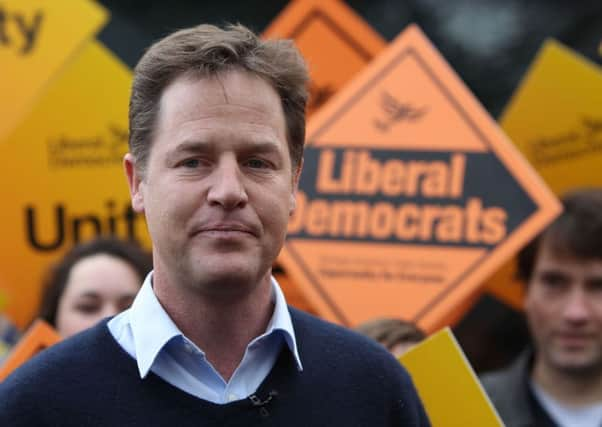Nick Clegg: Time to end postcode lottery over schools


But for years we have known that the life chances of children in Britain are dictated in large part by the economic circumstances of their parents. The wealthier mum and dad were, the more likely a child was to succeed. And the poorer the family, the less likely that a child would be able to reach their potential, regardless of their talent, ability or intellect.
Nearly a decade and a half ago, I travelled to Denmark, Holland and Sweden to visit a number of schools and see for myself how different approaches could reduce inequality and improve social mobility.
Advertisement
Hide AdAdvertisement
Hide AdAfter that trip, I co-authored a pamphlet calling for extra investment in schools targeted at the poorest children, to be used by headteachers in whatever way they saw fit as long as it helped those pupils to keep up with their better-off classmates.
That policy, the Pupil Premium, became Government policy in 2010 when the coalition was formed. The extra funding rose to £2.5bn a year and has paid for breakfast clubs and one to one tuition; for extra staff and equipment; and for outreach programmes to help engage parents.
It gave schools more than just the money to act – it gave them the incentive to focus on poorer pupils, backed up by Ofsted accountability.
And it has made a tangible difference. One of my proudest days in government was late in 2014 when the latest primary school results were published. They showed children from the poorest backgrounds getting their best ever results and the gap between them and their better off classmates narrowing.
Advertisement
Hide AdAdvertisement
Hide AdBut even as the gap between richer and poorer pupils in primary schools begins to close, progress in secondary schools has been far slower. By focusing strictly on socio-economic inequality, policy-makers like myself have been pre-occupied with just one part of the problem.
It is not just the relative wealth of parents that holds large numbers of bright kids back: it is postcode inequality too.
The Social Market Foundation analysed how well children aged 11 performed over three generations – those born in 1958, 1970 and 2000 – using verbal reasoning tests which could be compared across all groups.
For the youngest group – those who are in secondary school today – there were stark differences in performance in different regions. Those living in London, the South East and the North West had the highest proportion getting high scores whereas those living in the North East, Yorkshire and the West Midlands had the highest proportions getting poor scores.
Advertisement
Hide AdAdvertisement
Hide AdWe may live on a small island – but which corner of it our children call home makes a huge difference to their life chances too. And it is not just the region that matters. Other recent studies have shown that schools in seaside towns, for example, are struggling.
The good news is that it is possible for schools to buck the trend. Whereas we used to think of the inner cities as places where children generally struggled, in recent years we have seen a dramatic improvement in the performance of children in inner London and Birmingham.
However, the fact that this success is not replicated in other major cities is another sign that the problems are complex.
Postcode inequality is an issue which requires much more work in order to fully understand – and that is the work the SMF’s new commission on equality will be doing. We will compare the performance of schools in different areas – built up urban areas versus isolated communities for example – and also compare high-achieving schools with under-performing ones in similar areas.
Advertisement
Hide AdAdvertisement
Hide AdBut it is not all bad news. Change can happen. Take children from Asian backgrounds. Those born in 1970 were underperforming the national average at age 16 by 13 per cent. In other words, 13 fewer children out of every 100 were getting five or more good O-levels. Looking at those born in 1998, who took their GCSEs last year, pupils of an Indian or Chinese background now outperform the national average by a similar margin.
Children from Bangladeshi and Black African families are also above the average. And children from a Pakistani background are catching up too. Yet, despite these shards of light, it is clear that Britain is a starkly unequal country and it is a damning indictment that a child born today stands less chance of realising their potential if they are born in a different part of our country to another child.
We all owe it to future generations to give them the best possible chance to reach their potential, regardless of the circumstances of their birth.
Nick Clegg is the former Deputy Prime Minister. The Sheffield Hallam MP has just launched the Social Market Foundation’s cross-party Commission on Inequality in Education.